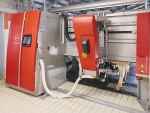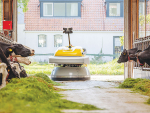LELY HAS launched a new automated feeding system. The Lely Vector is the next major step in automating working methods within dairy farming and as such, it matches the impact of the milking robot, the company says.
The Lely Vector makes sure that correct rations are fed to cows consistently and on time, allowing cattle farmers to achieve efficient and high-grade milk and beef production. This new system has been developed in close co-operation with Lely’s customers.
Lely says the system ensures a constant supply of feed in a flexible manner, 24 hours a day, seven days a week. The process is fully automated and ensures optimal flexibility for cattle farmers using the system.
The Lely Vector enables cattle farmers to define and adjust their feeding strategy for different groups of animals, it says.
“This results in improved animal health, improved feed efficiency resulting in optimal milk and beef production.
“The feed is stored in the feed kitchen; an open area without any obstacles, in which all kinds of feed can be stored, each in its own location. Depending upon the size of the feed kitchen, feed can even be stored for a three-day period. This means that that there is sufficient feed for more than a weekend, so that cattle farmers and their families can enjoy more free time.”
A grabber moves over the kitchen to select the feed, and load it in onto the mixing and feeding robot.
The grabber scans the part of the storage area that has been designated for a specific feed and collects the it from the highest point.
A concentrates dispenser monitors the quantities, which can be established and measured with the utmost accuracy. In addition, minor quantities of minerals and additives can be mixed with the concentrates. A user interface with touch screen is used to set up the feeding plan and the feed kitchen. It is also possible to programme rations and view a variety of reports.
The feed level sensor is a technological tour de force. The robot knows exactly how much feed there is at the gate and it determines when and where it is required, without any intervention from the cattle farmer required. Because there is an ongoing supply of feed, it is not necessary to measure large doses, and therefore the feed is always fresh.
The company says the Lely Vector saves money, labour, time and energy.
“It uses much less energy than many other feeding systems and is therefore less expensive to operate. Test farms have shown that labour savings are huge when feeding two or more different rations. The Lely Vector also saves dairy farmers a lot of hassle. Filling the feed kitchen is all that remains for them to do.
“Furthermore, thanks to the electric control system, the Lely Vector is noiseless and environmentally-friendly, and does not disturb either man or animal.”
For Lely the Lely Vector is as groundbreaking as the introduction of the first Lely Astronaut milking robot.
To safeguard a professional roll-out and development of the Lely Centre distribution network, Lely has opted for a roll-out in phases over different countries.
The first countries include the Netherlands and Scandinavia where Lely has been testing this concept, and France. For other countries, such as Germany, Australia and New Zealand no offers will be made yet, not even for deliveries in the future, it says.


















